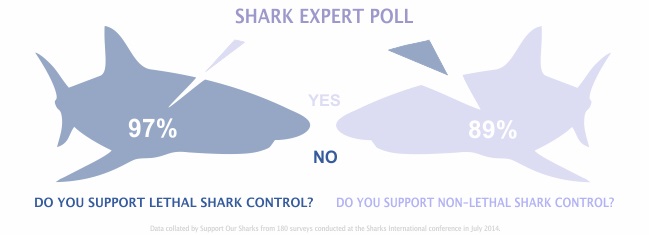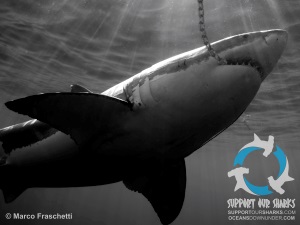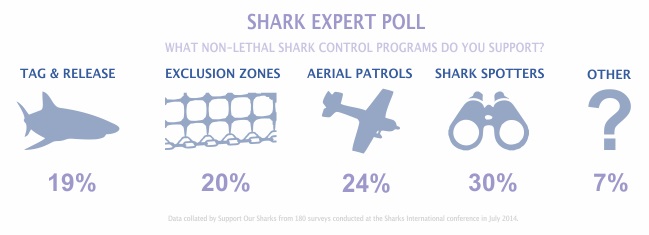[VIDEO] 97% of Experts are Opposed to
Lethal Shark Control Programs
Article by Support Our Sharks (01 September 2014)
In recent years, shark mitigation has become a
topic of international debate after Western Australia began
culling
sharks in response to a spate of fatal shark bite incidents in the
region. This was followed by La Reunion Island instating a
culling
program and banning water activities at certain beaches after they
also recorded a rise in shark bite incidents.
Despite pressure from the public and scientists for
governments to adopt
non-lethal shark control policies, both WA and
Reunion Island proceeded with their lethal shark control programs.

In June 2014, scientists and experts from all
over the world descended upon Durban, South Africa to attend the
Sharks International conference.
The conference was an opportunity for the world’s shark
experts to share their latest research findings and discuss
developments in shark conservation. We took this opportunity to
raise the issue of shark control and ask the delegation of more than
300 attendees what their expert views were on the management of
sharks to mitigate the risks posed to ocean users.
Unfortunately, many scientists and experts often choose not to enter into the shark control debate through fear of losing their job or funding for their research. Therefore, to ensure we collected views from all sectors, we allowed conference delegates to anonymously complete our survey, giving individuals the freedom to speak out on the issue.
We found that 97% of experts were opposed to
any form of lethal control and 89% were supportive of non-lethal
control measures.

The remainder of delegates surveyed were either
in favour of lethal control measures (3%) or didn’t think that any
form of control was necessary (11%) due to the minute risk that
sharks pose to humans.
Frequently, delegates highlighted that culling
programs are detrimental to many forms of marine life, not just
sharks, and that culling is an outdated control method.
 Historically,
shark culling programs have not been viewed as an effective approach
to managing the risk of shark bites on ocean users. In fact, when
shark culling was carried out in Hawaii (between 1959 to 1976), over 4,500 sharks were killed,
and yet there was no significant decrease in the number of shark
bites recorded.
Historically,
shark culling programs have not been viewed as an effective approach
to managing the risk of shark bites on ocean users. In fact, when
shark culling was carried out in Hawaii (between 1959 to 1976), over 4,500 sharks were killed,
and yet there was no significant decrease in the number of shark
bites recorded.
Culling has
been the primary shark mitigation policy of the New South Wales
Government for over 60 years through the use of
“shark” nets. A report by the
Department of Primary Industries showed that, despite this, 23 of
the 139 (17%) shark bite incidents in the state between 1937 and
2009 occurred at netted beaches, the very beaches that are meant to
be protected from such events.
Many experts stated that more investment is needed to develop new technologies for monitoring sharks and the use of non-lethal deterrents should be explored further. Of the non-lethal approaches suggested, experts were divided with a relatively even number promoting tag and release methods, shark exclusion zones (ie: Eco-Barrier), aerial patrols, and shark spotting programs.

Concerns were raised, however, over the expense
and effectiveness of some of these programs, and some experts
questioned whether it was necessary to implement any form of control
at all (lethal or non-lethal). Rather, some experts suggested that
the money should be invested into educating the public about the
risks of entering the ocean and how individuals can reduce their
risk of a negative encounter with a shark.
To conclude, there is a clear concern amongst
global shark experts that current lethal control policies being
employed in Australia, South Africa, and worldwide are no longer
appropriate given advances in modern technology and our greater
understanding of the important role sharks play in marine
ecosystems. Greater investment in research, public education, and
non-lethal shark management strategies is seen as the best way
forward.
-----------------------------------------------
Please share your thoughts about this article below.
Other Interesting Articles:
Disclaimer
Support Our Sharks posts articles and material
prepared by other organisations and individuals not affiliated with
Support Our Sharks for educational purposes. Support Our Sharks does not
necessarily agree with the opinions expressed in such material. Support
Our Sharks also provides links from this site to the websites of
featured news articles above for informational purposes only. The links
do not imply an endorsement by Support Our Sharks of these articles or
the content of their respective web pages.
